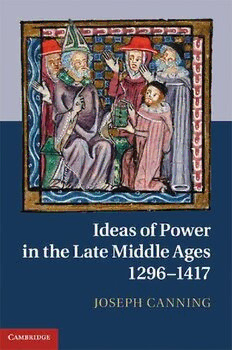
Ideas of Power in the Late Middle Ages, 1296–1417 PDF
Preview Ideas of Power in the Late Middle Ages, 1296–1417
IDEAS OF POWER IN THE LATE 1296 1417 MIDDLE AGES, – Through a focused and systematic examination of late medieval scholasticwriters–theologians,philosophersandjurists–Joseph Canningexploreshowideasaboutpowerandlegitimateauthority were developed over the ‘long fourteenth century’. The author provides a new model for understanding late medieval political thought, taking full account of the intensive engagement with political realitycharacteristic of writers in this period. He argues that they used Aristotelian and Augustinian ideas to develop radically new approaches to power and authority, especially in response to political and religious crises. The book examines the disputes between King Philip IV of France and Pope Boniface VIII, and draws upon the writings of DanteAlighieri,MarsiliusofPadua,WilliamofOckham,Barto- lus, Baldus and John Wyclif to demonstrate the varietyof forms of discourse used in the period. It focuses on the most funda- mental problem in the history of political thought – where does legitimate authority lie? joseph canning isAffiliatedLecturerintheFacultyofHistory at the University of Cambridge. He taught for many years at Bangor University, where he was Reader in History until 2007, and from 1996 to 2001 he was Director of the British Centre for Historical Research in Germany at the Max-Planck-Institut fu¨r Geschichte in Go¨ttingen. He edited Power, Violence and Mass Death in Pre-Modern and Modern Times (2004) with Hartmut LehmannandJayWinter,andhisotherpublicationsincludeThe Political Thought of Baldus de Ubaldis (1987) and A History of Medieval Political Thought, c. 300 – c. 1450 (1996). IDEAS OF POWER IN THE 1296 1417 LATE MIDDLE AGES, – JOSEPH CANNING cambridge university press Cambridge,NewYork,Melbourne,Madrid,CapeTown, Singapore,Sa˜oPaulo,Delhi,Tokyo,MexicoCity CambridgeUniversityPress TheEdinburghBuilding,Cambridgecb28ru,UK PublishedintheUnitedStatesofAmericabyCambridgeUniversityPress,NewYork www.cambridge.org Informationonthistitle:www.cambridge.org/9781107011410 #JosephCanning2011 Thispublicationisincopyright.Subjecttostatutoryexception andtotheprovisionsofrelevantcollectivelicensingagreements, noreproductionofanypartmaytakeplacewithout thewrittenpermissionofCambridgeUniversityPress. Firstpublished2011 PrintedintheUnitedKingdomattheUniversityPress,Cambridge AcataloguerecordforthispublicationisavailablefromtheBritishLibrary LibraryofCongressCataloguinginPublicationData Canning,Joseph,1944– IdeasofpowerinthelateMiddleAges,1296–1417/JosephCanning. p. cm. isbn978-1-107-01141-0(Hardback) 1. Power(Socialsciences)–History–To1500. 2. Authority–History–To1500. 3. Power(Socialsciences)–Earlyworksto1800. 4. Authority–Early worksto1800. i. Title. jc330.c3372011 303.301–dc23 2011019697 isbn978-1-107-01141-0Hardback CambridgeUniversityPresshasnoresponsibilityforthepersistenceor accuracyofURLsforexternalorthird-partyinternetwebsitesreferredto inthispublication,anddoesnotguaranteethatanycontentonsuch websitesis,orwillremain,accurateorappropriate. For Lucy, Martin, Peter and Polly Contents Preface page ix List of abbreviations xi 1 Introduction 1 Ideas of power and authority during the disputes 11 between Philip IVand Boniface VIII 2 60 Dante Alighieri: the approach of political philosophy 3 81 Marsilius of Padua 4 107 Power and powerlessness in the poverty debates 5 133 The treatment of power in juristic thought 6 1378 1417 165 The power crisis during the Great Schism ( – ) 192 Conclusion Bibliography 198 Index 212 vii Preface This book is the result of my growing fascination with questions of power and authority. This marks something of a change in my attitude to political thought. When I undertook my first research project I was driven on by the idea of consent. Maybe, over time, I have become more sensitive to the realities of political life. In writing this book I have benefited so much from discussion with other scholars and students, both graduate and undergraduate. Pride of place must go to all my students over the years at Bangor University: those who took my Special Subject, ‘Ideas of Church 1294 1356 and State, – ’, and my course on ‘Medieval Political Thought’,throughtheirhighlyintelligentandinformed discussions, helpedmeenormouslyinthedevelopmentofmyideas.Iamgrateful toBangorUniversityforitssupportingrantingmestudyleaveatan early stage of composition. I should also like to thank Philip Pettit for his gracious invitation to give a paper to the Political Philosophy Colloquium at Princeton University. I was much encouraged by the intense and constructive discussion with colleagues there. I have found it very stimulating to try my ideas out on scholars from a variety of disciplines: history, politics, law, philosophy and literature.Havingtogobeyondmyintellectualcomfortzonehelped me make real progress in my understanding – those from other disciplines always posed new and unexpected questions which led me to review my ideas and interpretations. I was especially helped bydiscussions when I gave papers at a range of universities: Leeds, Sheffield, Southampton, Trinity College Dublin, University College Dublin and University College London. In recent years ix
